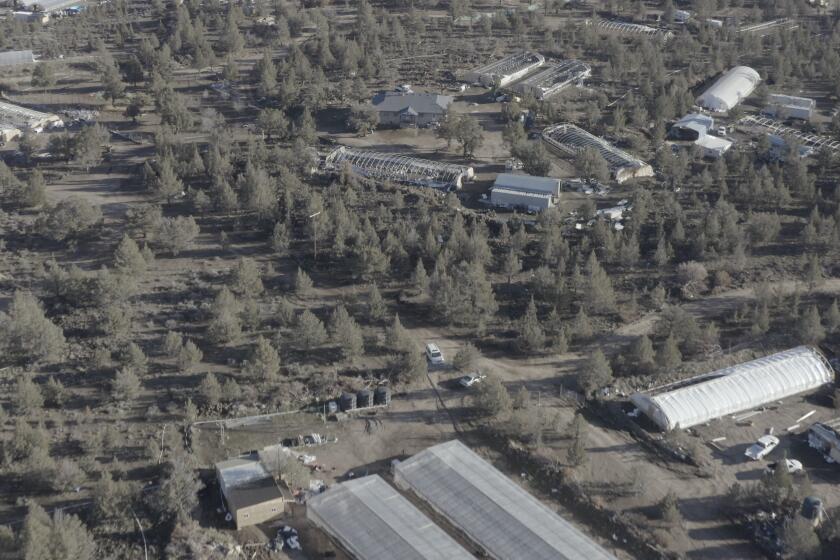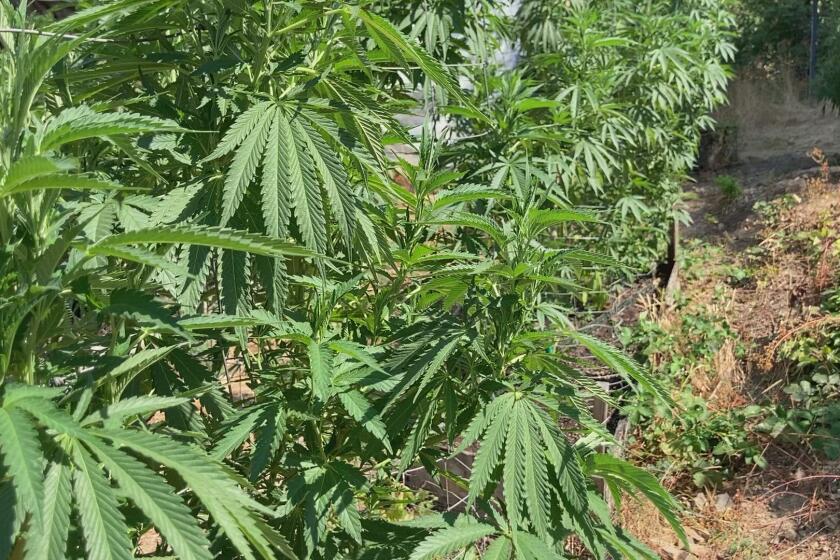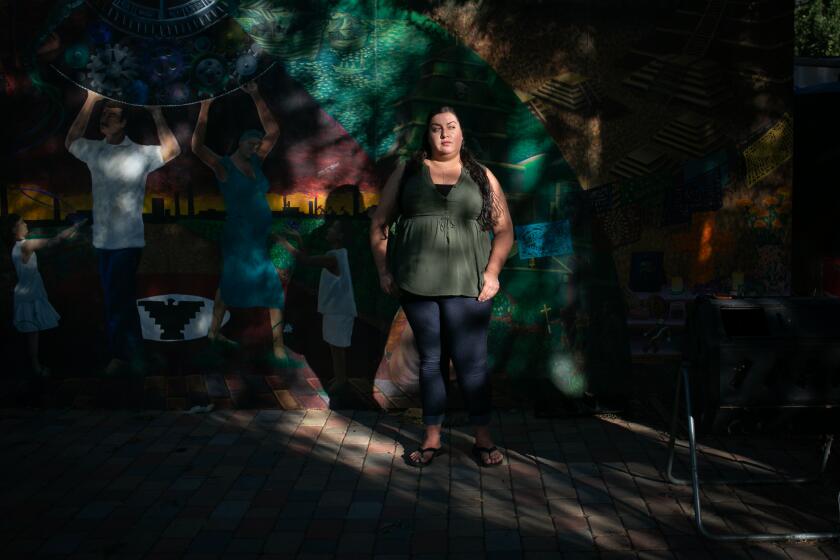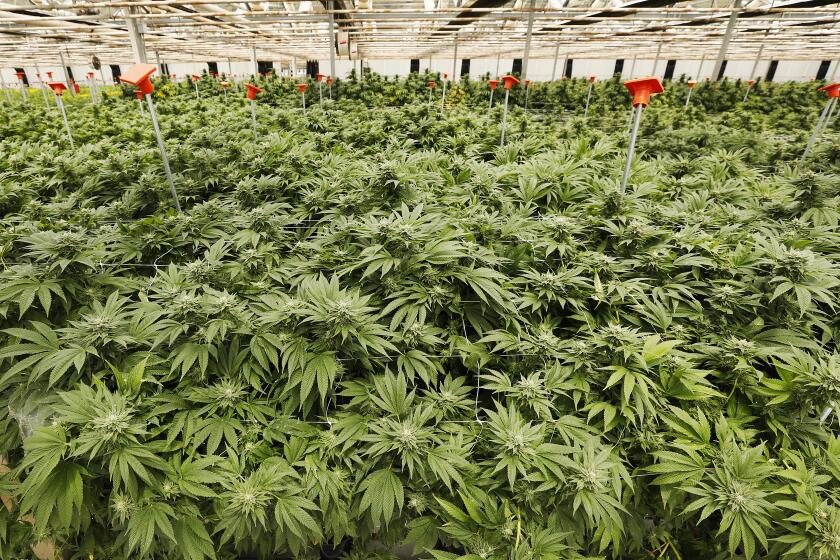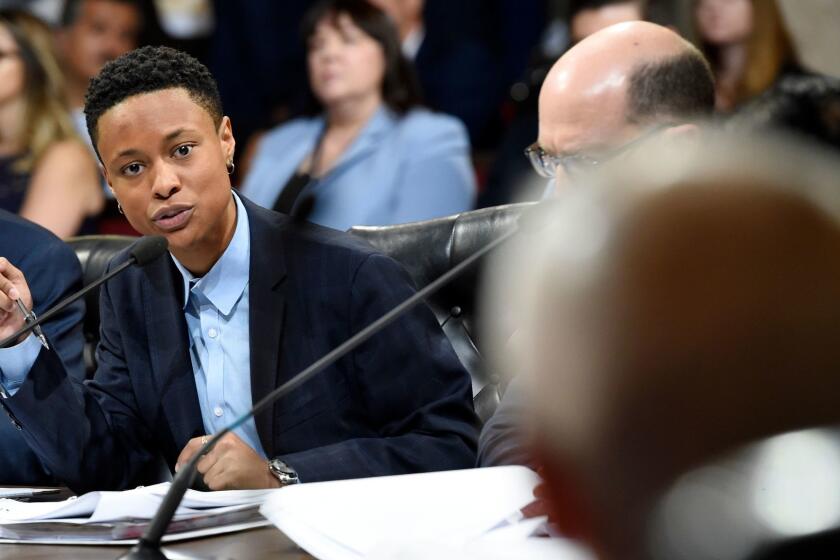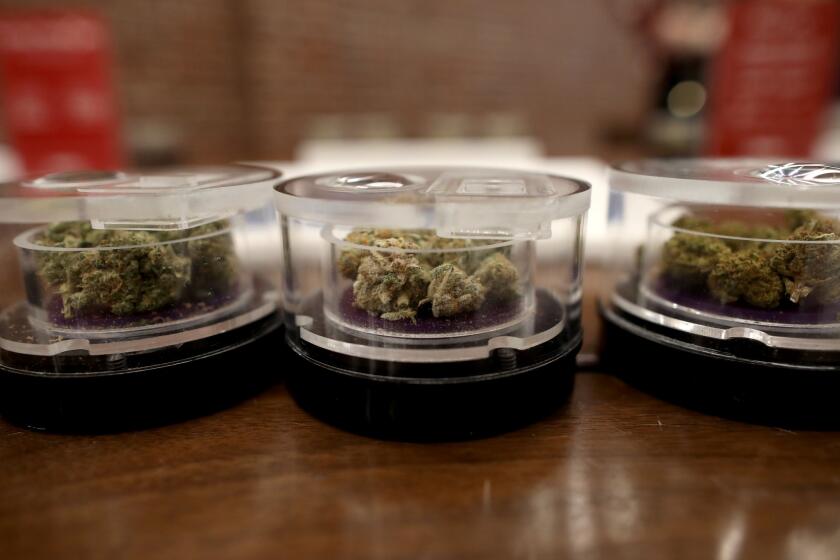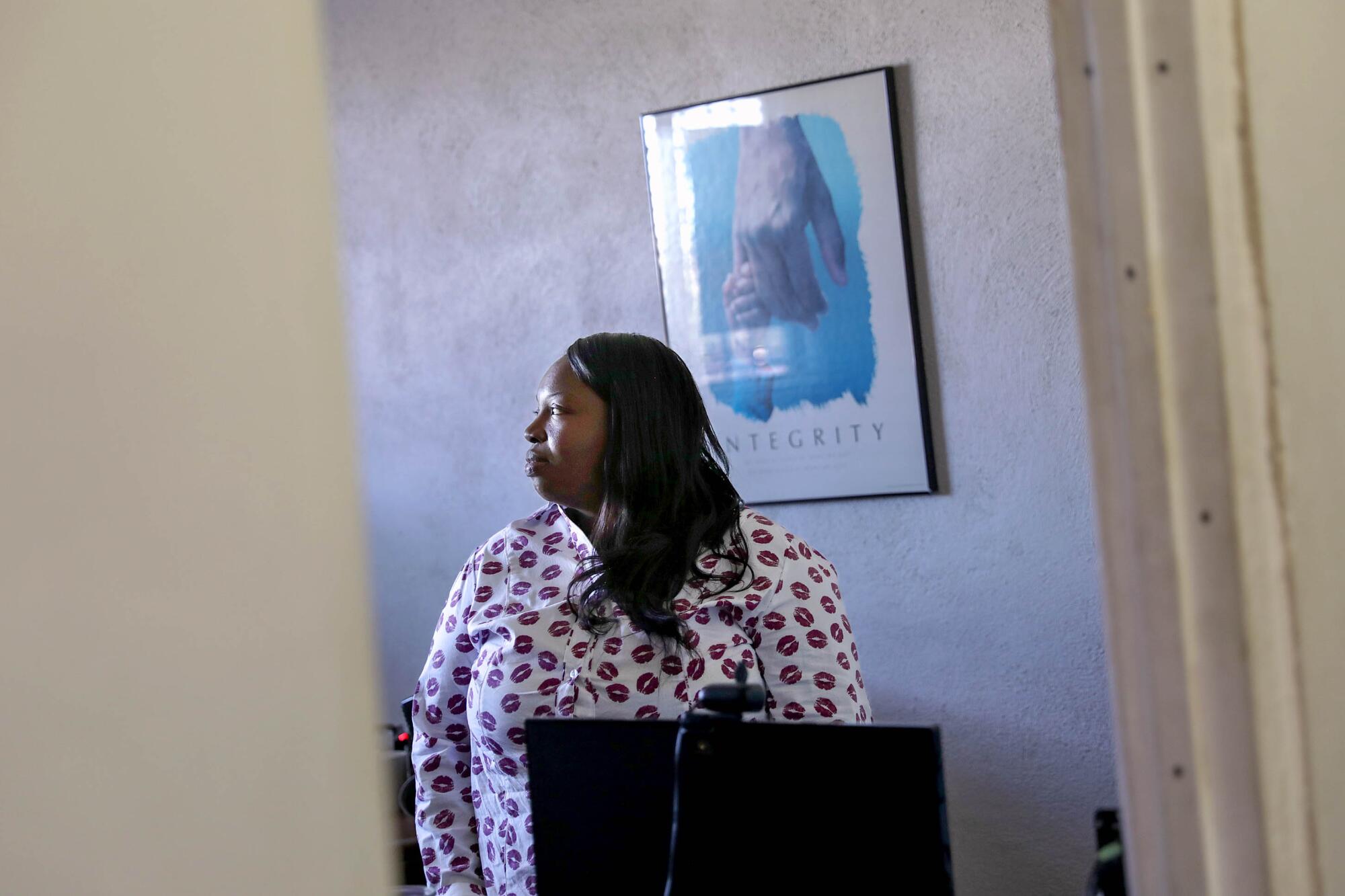
- Share via
The very thing that had once torn Ingrid Archie from her daughters and led to her incarceration now made her bubble with unbridled optimism.
It was early 2019, a year after recreational pot sales began in California under Proposition 64, and politicians and activists were proclaiming that Archie and others who grew up in communities disproportionately criminalized by the “war on drugs” could now profit off the legal cannabis industry as entrepreneurs.
Buoyed by that promise — “social equity,” as it became known — Archie, then in her late-30s, began the process of applying for a retail cannabis license. Years earlier, she’d been convicted of possessing pot for sale. Now, she dreamed of opening a holistic community center in South L.A. that would sell edibles, hold homeownership seminars and provide mental health services. Finally, she thought, a pathway to generational wealth for many in her community.
But Archie hit one bureaucratic hurdle after another. Other equity applicants hired attorneys with expertise in navigating the new cannabis regulations, but she couldn’t afford a $10,000 retainer.
“My life was shattered for something that’s now legal, and now I have to jump through hoops?” she said. “I felt demoralized.”
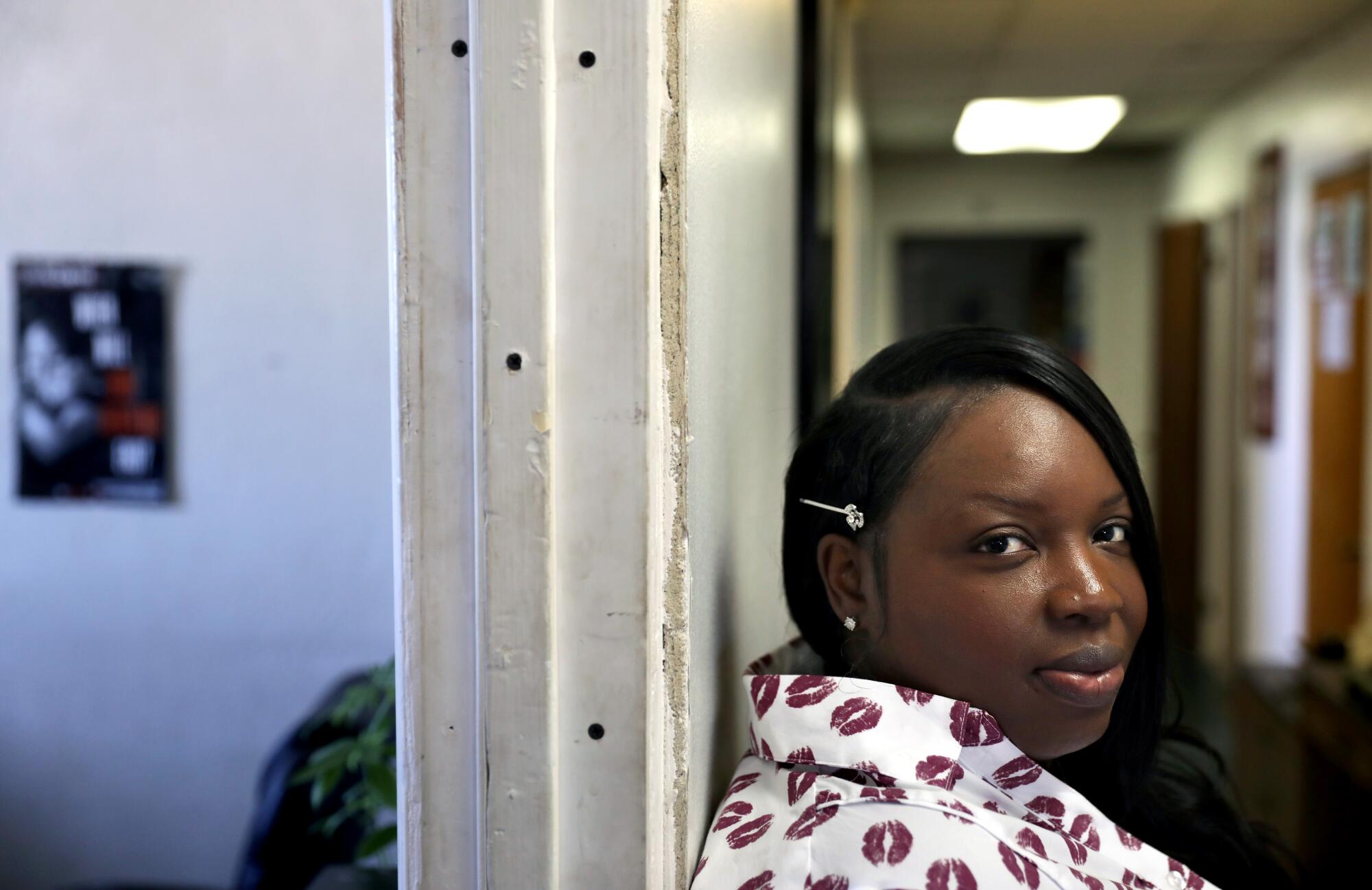
Five years after California voters legalized recreational cannabis for adults, many cities and counties have yet to adopt programs to boost the chances of success for hopeful Black and Latino cannabis entrepreneurs. In places that have, those programs have been plagued by a lack of funding, shifting requirements and severe delays in processing applications, often creating additional hardships and roadblocks instead of removing them.
A Times review of state data found that equity applicants represented only a small fraction — less than 8% — of all people granted cannabis licenses through the end of 2020 in several of the state’s largest jurisdictions.
In addition, local officials around the state created different regulations for licensing cannabis businesses and meeting social equity qualifications. So far, existing medical pot dispensaries and established cannabis chains with vastly more experience and resources are frequently winning out. Even city leaders and officials in charge of clearing a pathway for more inclusion acknowledge the programs have struggled.
As a result, a process intended to atone for past wrongs has, for many, made their lives distinctly harder, shattering their stability, wiping out their life savings and jeopardizing homes and property.
A major impediment was the requirement in Los Angeles and other areas that applicants secure property before applying for licenses. As the process became mired in bureaucratic delays, many were stuck paying thousands of dollars a month on empty buildings, prompting some applicants to refinance homes and borrow from relatives.
“People had dreams and hopes of building generational wealth,” said Bonita Money, founder of the L.A.-based National Diversity and Inclusion Cannabis Alliance. “And it’s done just the opposite. It’s ruining lives at this point.”
California’s legalization of recreational cannabis in 2016 ushered in a multibillion-dollar industry estimated to be the largest legal weed market in the world. But many of the promises of legalization have proved elusive. In a series of occasional stories, we’ll explore the fallout of legal pot in California.
In 2018, then-Gov. Jerry Brown signed into law the California Cannabis Equity Act, a measure designed to provide those most harmed by cannabis prohibition “assistance to enter the multibillion-dollar cannabis industry as entrepreneurs or as employees with high-quality, well-paying jobs.”
The law — Senate Bill 1294 — cited state Department of Justice data from 2006 to 2015 showing that Black Californians were five times more likely to be arrested for cannabis felonies than white Californians despite using and selling cannabis at similar rates. During the same period, Latinos were 35% more likely to be arrested for cannabis crimes than white people.
While the law didn’t mandate that cities establish equity programs — and many have not — it paved the way for doling out millions in state funds to those that did. But the ambition of the legislation quickly pushed up against the realities of a limited market already saturated with illegal sales and a few big cannabis companies. Before long, many industry experts say, it became clear that the same people who typically win in other industries — those with the most social, political and economic capital — were winning here too.
Sixteen cities and counties had issued licenses to a combined 203 equity applicants through December 2020, according to a Times review of data in a recent report to state lawmakers. At the same time, 2,355 non-equity applicants got licenses. Many of those went to preexisting medical marijuana dispensaries. Some jurisdictions had not issued a single equity license.
As of early January, officials in Palm Springs and Long Beach said their cities each had one equity cannabis business; San Francisco had 18; Sacramento, 19; and Oakland, 186. And across huge swaths of the state there are no social equity programs, although officials in San Diego are developing one.
Illegal cannabis farms are engulfing parts of California and exploiting farmworkers who labor in squalid, deadly conditions, a Times investigation finds.
In Mendocino County, which has received more than $3 million from the state for equity efforts, no applicant had met all the eligibility criteria, including having a very low income, according to a recent report from the California Cannabis Industry Assn. In Oakland, which created the nation’s first equity program more than four years ago, 63% of equity applicants who responded to a recent survey said the gross receipts of their business the previous year had been less than $50,000. And the city has begun sending delinquent notices to collect on unpaid loans.
The cannabis industry report found that social equity programs were not working as intended and urged the Legislature to create an oversight commission that would include cannabis business owners and community members.
This month, the state’s Department of Cannabis Control began distributing $100 million approved by the Legislature — including $22 million earmarked for Los Angeles — to help businesses transition temporary licenses to annual ones, which will require costly and complex environmental reviews.
In Los Angeles, which has received more than $9 million from the state for its equity program, 1,270 temporary licenses — 358 of them equity — had been granted through mid-January. Some of the licenses are for retail shops, but others are for cultivation, manufacturing and distribution.
Los Angeles’ program has had several widely publicized setbacks, including long delays and several lawsuits, which some industry experts believe could have a chilling effect on similar initiatives across the country.
“A lot of other places were looking to California as a model,” Money said, adding that she believes that watching the delays and complications play out in L.A. has discouraged other jurisdictions.
Los Angeles City Council members Marqueece Harris-Dawson and Curren Price recently called for changes to the city’s licensing practices, including giving the Department of Cannabis Regulation deadlines to review certain applications and update a licensing map on its website that shows pending retail cannabis businesses, as well as schools, libraries and other locations that would disqualify a shop from opening within 700 feet.
California’s legalization of recreational cannabis in 2016 ushered in a multibillion-dollar industry. But many of the promises of legalization have proved elusive.
In an interview, Harris-Dawson, who represents a stretch of South L.A. that for years was disproportionately targeted for marijuana arrests, said four equity shops in his district have opened to date. Many other applicants, he said, have lost their life savings waiting.
“It’s absolutely infuriating,” he said of the gulf between the promises made to applicants and the current reality. “This is the perfect example of why no one trusts the government.”
Officials in the Department of Cannabis Regulation said in a statement that the agency has already implemented several key components of the city’s equity program.
“It’s growing and adapting to the needs of program participants,” the statement said. The department recently drafted its own recommendations in response to the City Council motion and asked for more resources and staffing. Last month, the city’s Cannabis Regulation Commission, which provides input on L.A.’s cannabis rules, voted in support of the department’s recommendations.
It’s absolutely infuriating. This is the perfect example of why no one trusts the government.
— Los Angeles City Council member Marqueece Harris-Dawson
In an interview, Cat Packer, the department’s executive director, acknowledged that there have been growing pains, but said the process has steadily improved.
The department has increased technical and financial assistance for equity applicants, she said, and has sought amendments to the city’s municipal code to refine the process. Equity in the cannabis industry requires bold, immediate and long-term strategies in both the private sector and at every level of government, Packer said.
“I don’t think we’ll soon be saying that we got it right,” she said, “but we should be able to say, ‘We’re relentless about getting it right.’”

The social equity component of cannabis reform laws proved difficult from the start.
Government programs can’t consider race as an eligibility criterion under California law, so local officials crafted imperfect workarounds to determine who would qualify. The program in Los Angeles considers various factors — income, past cannabis arrests and long-term residency in an area with disproportionately high cannabis arrest rates — and has tightened the criteria though the years.
More than 30,000 Californians are stuck with felonies, misdemeanors and other convictions on their records that should have been wiped automatically.
A consulting firm hired by the city identified police reporting districts with disproportionate arrest rates, but the City Council initially chose instead to use ZIP Codes, a less precise option that looped in some affluent and largely white areas, including Los Feliz. They later switched to police reporting districts.
Would-be equity applicants were further hindered in their attempts to obtain capital because the use and possession of cannabis is still illegal under federal law — a complicating factor industrywide, but one that is especially hard to overcome for entrepreneurs already starting from behind.
Unable to get loans from mom-and-pop banks, many hopeful entrepreneurs are left with few options other than relying on predatory investors. One local industry expert described recruiters descending on housing projects in South L.A., offering $7,000 to people with cannabis convictions in exchange for using their name on official paperwork. And risk-averse landlords often doubled rental rates once they learned the building would house a cannabis shop.
Many entrepreneurs have gambled on the process, knowing that, for some, the industry has been lucrative — but that success is far from guaranteed, said Money of the L.A.-based cannabis alliance.
It’s hard to estimate how much a typical legal pot shop in L.A. makes, Money said. It varies depending on location and marketing budget, but anywhere from $2,000 and $20,000 a day is not uncommon. Some businesses, undercut by the cheaper illicit market, make far less and struggle to make much of a profit at all.
“People think you’re a millionaire overnight, and it’s not true,” she said. “People are really just trying to stay afloat.”

Social equity applicant Kika Keith’s dream of opening her own cannabis business began almost as soon as she heard about plans for legalization.
In the spring of 2018, she signed a lease for a shop on Crenshaw Boulevard, a short drive from where she grew up, and was soon locked into $12,000-a-month rent payments — the “cannabis rate,” she calls it, for a space that, if used for another purpose, would’ve rented for about $5,000 a month.
Then she waited and waited on a license.
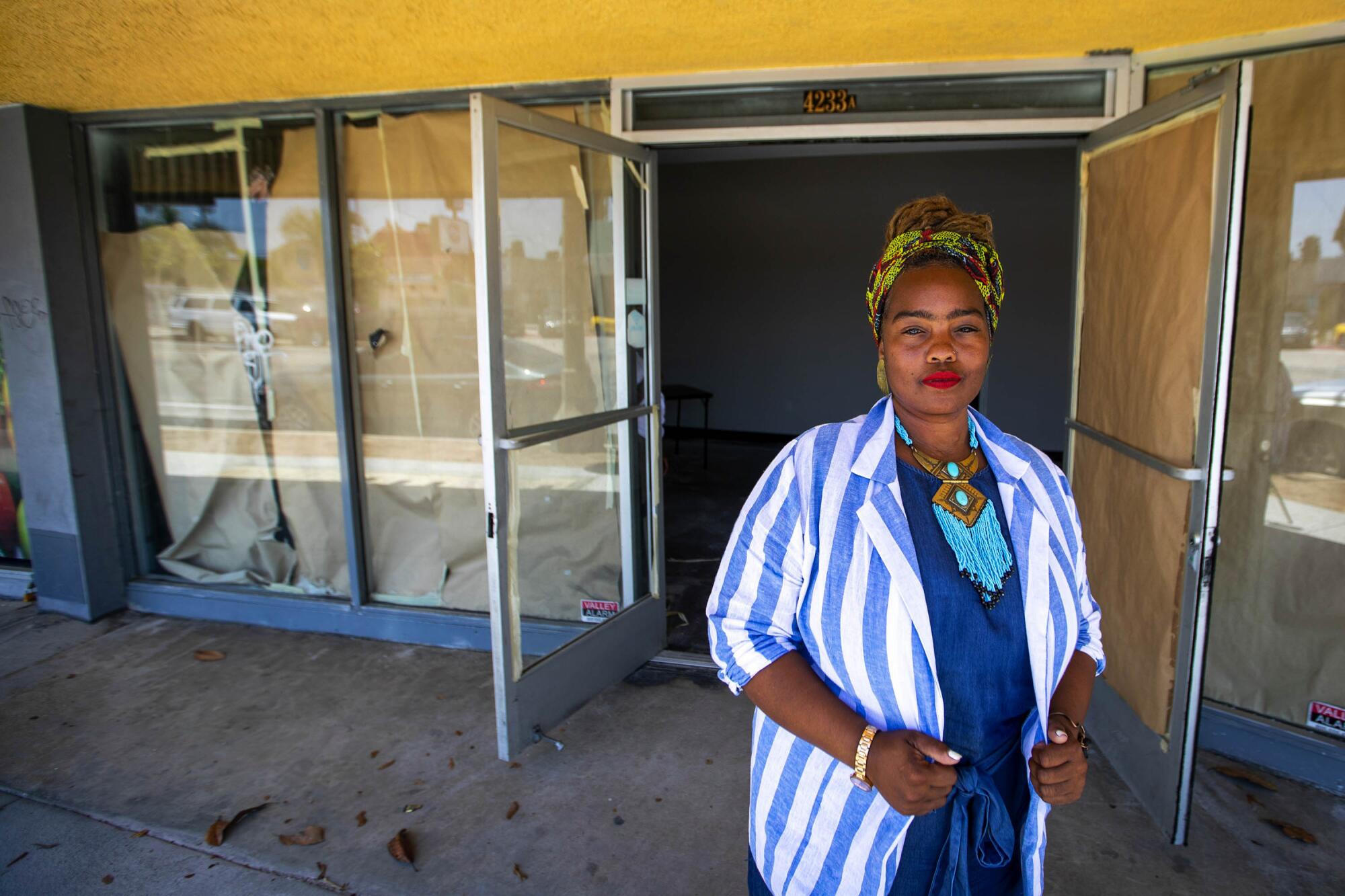
She often struggled to square those stressful days with the sense of boundless opportunity she’d felt right after legalization, when politicians visited South L.A., sowing lofty expectations. Never again in your lifetime, Keith remembers hearing, will Black people have a chance to be at the forefront of a new industry.
Focusing on the social justice component was an effective campaign tactic, Keith said, a way to convince people who weren’t themselves cannabis users that there was a higher purpose in reforming state law and local cannabis measures.
“The deception was so egregious,” said Keith, now 50.
She still vividly recalls the time after she signed her lease and began fine-tuning her application ahead of the day now infamously referred to by many applicants as “the Race.”
The Department of Cannabis Regulation’s licensing application window was set to open at 10 a.m. Sept. 3, 2019. The first 100 eligible equity applications submitted online would win an opportunity for a license.
Knowing it would likely come down to a matter of minutes or seconds, Keith and a group of other applicants rented fast computers. The application window lasted two weeks, but most applications — 656 — came within the first hour. Keith’s was 144.
Frustrated applicants soon began packing into City Hall complaining about glitches, including some people obtaining access before 10 a.m. Mayor Eric Garcetti eventually called for an audit.
The deception was so egregious.
— Kika Keith, owner of Gorilla Rx cannabis dispensary in Los Angeles
Around that same time, Keith’s investor pulled out because of the wait. She cobbled together money from friends and various cannabis groups, but soon fell behind on rent.
Auditors faulted the Department of Cannabis Regulation for “imprecise messaging” and found that more than 200 applicants had accessed the online platform before 10 a.m., including 14 who started their applications early. But the audit ultimately concluded that the city had taken steps to push applicants back to the proper place in line and made “reasonable” efforts to prevent unfairness in the process, leaving the applicants who lost out no better off.
Los Angeles will be the biggest beneficiary of the money, which was proposed by Gov. Gavin Newsom to help cannabis businesses acquire permanent licenses.
Keith was stunned.
By that point, she and her investors had already shelled out $350,000, largely on rent on an empty building. For the sake of her three daughters, Keith had long strived to live as an optimist — not to be too deeply swayed by things beyond her control. But she felt a heavy weight during that time and wondered how much longer she could hold on to her empty space.
A group she co-founded called the Social Equity Owners and Workers Assn. sued the city, arguing that the process had been unfair. It ultimately dropped the suit after the city changed its rules in the summer of 2020, replacing the first-come, first-served process with a lottery system in which applicants can secure property after they’ve been selected. The city also tightened eligibility criteria for the lottery round, requiring that applicants have a past cannabis arrest or conviction. As part of a settlement agreement with the cannabis entrepreneurs, the city agreed to process the next 100 applications in line, which included Keith’s submission.
L.A. is revamping its rules for handing out licenses to cannabis businesses amid anger and disappointment over the tumultuous rollout of the program.
It took several more months and intervention from her local council member before her license was finalized.
In late August, by which point she and her investors had paid out $1.5 million, she finally opened the doors of her shop, Gorilla Rx. And on a recent afternoon, Keith, dressed in a “Black Women Get Us HIGHER” hoodie, walked around her bustling, brightly lit shop lined with shelves neatly arranged with pre-rolled joints, tinctures and cannabis-infused olive oil. Since opening five months ago, Keith said, 15,000 people have walked through the doors of her shop, an average of about 100 a day.
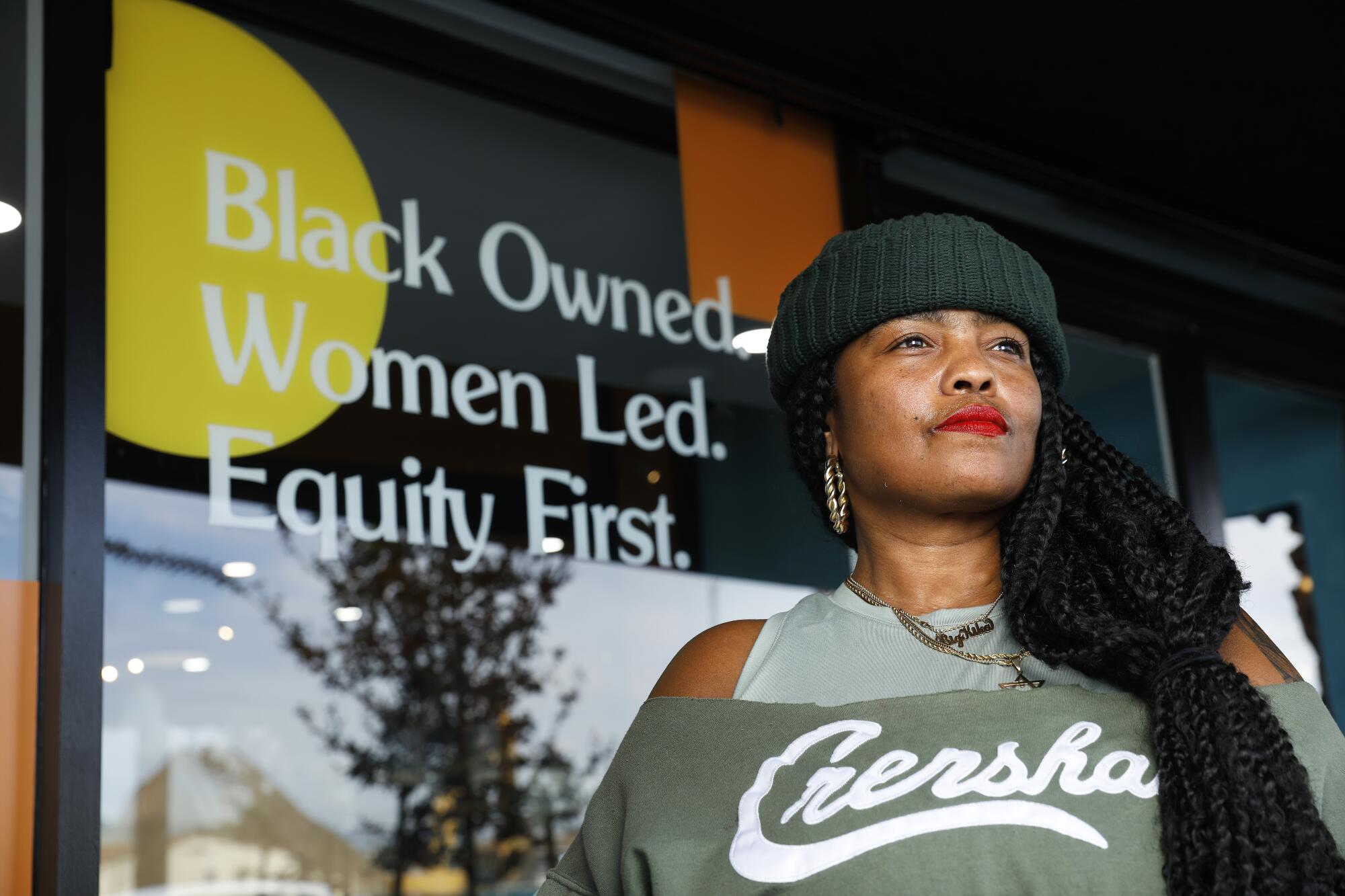
“The house the people built,” she proudly calls it, for everyone who rallied around her through the process.
She’s determined to pay it forward, Keith said, by speaking with others about their in-the-works equity programs, including one in New York, and advocating for improvements to L.A.’s program, including the recent changes proposed by cannabis department officials that she supports.
Keith knows that, in many ways, her pathway to licensure was exceptional. Without her previous experience working in the food and beverage industry, which required her to navigate another highly regulated space, she doubts she would have made it this far.
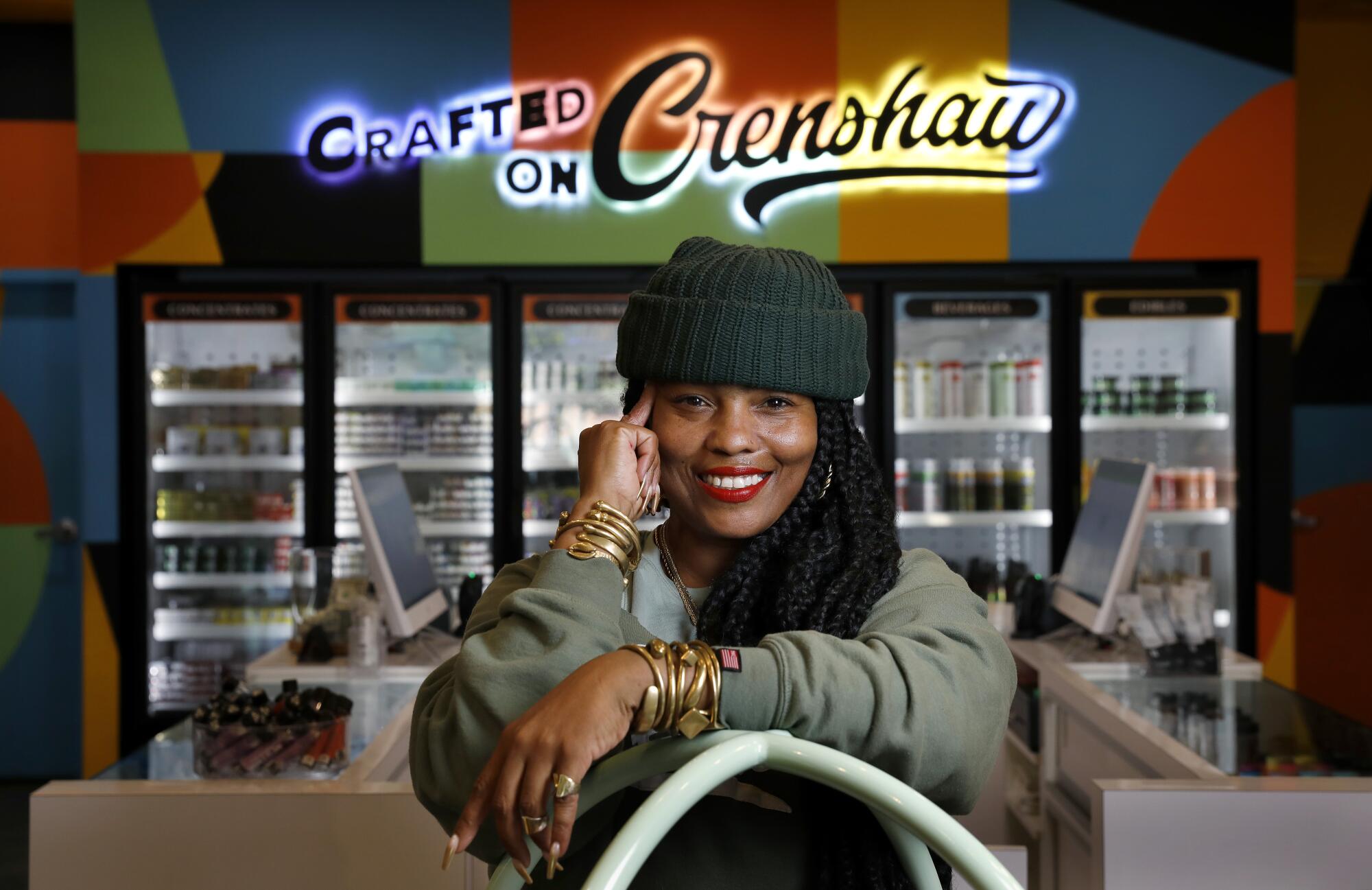
“All those people behind me probably won’t make it unless something is done,” she said. “And this has to be done right. There is a higher human rights obligation.”

It was that very obligation that initially piqued Archie’s interest in Proposition 64, leading her to speak publicly in support of the measure in several interviews at the time.
“I was the poster child,” said Archie, one of the first people in the state to have an old cannabis conviction cleared from her record under the law.
With a tangled family history of drug addiction, Archie landed in the streets as a teenager and began selling drugs to get by.
They used people’s lives as a political ploy. It’s a damn shame.
— Ingrid Archie
One of the factors of eligibility for equity applicants is a conviction on a cannabis offense. But because her case had been cleared, she had no record when officials looked. Eventually, she tracked down an old probation report.
Her co-workers connected her with an investor who already had a business location to open her shop, and Archie rushed to prepare her application ahead of the Race. She ultimately placed in the 400s, she said, and since then has given up pursuing a cannabis license.
“They used people’s lives as a political ploy,” said Archie, who works as a social justice organizer. “It’s a damn shame.”

There is another pathway to getting an equity license, in which the City Council can lift caps on the maximum number of shops allowed in certain parts of the city — a step that happened in the stretch of downtown where Crystal Ryan dreamed of opening a shop.
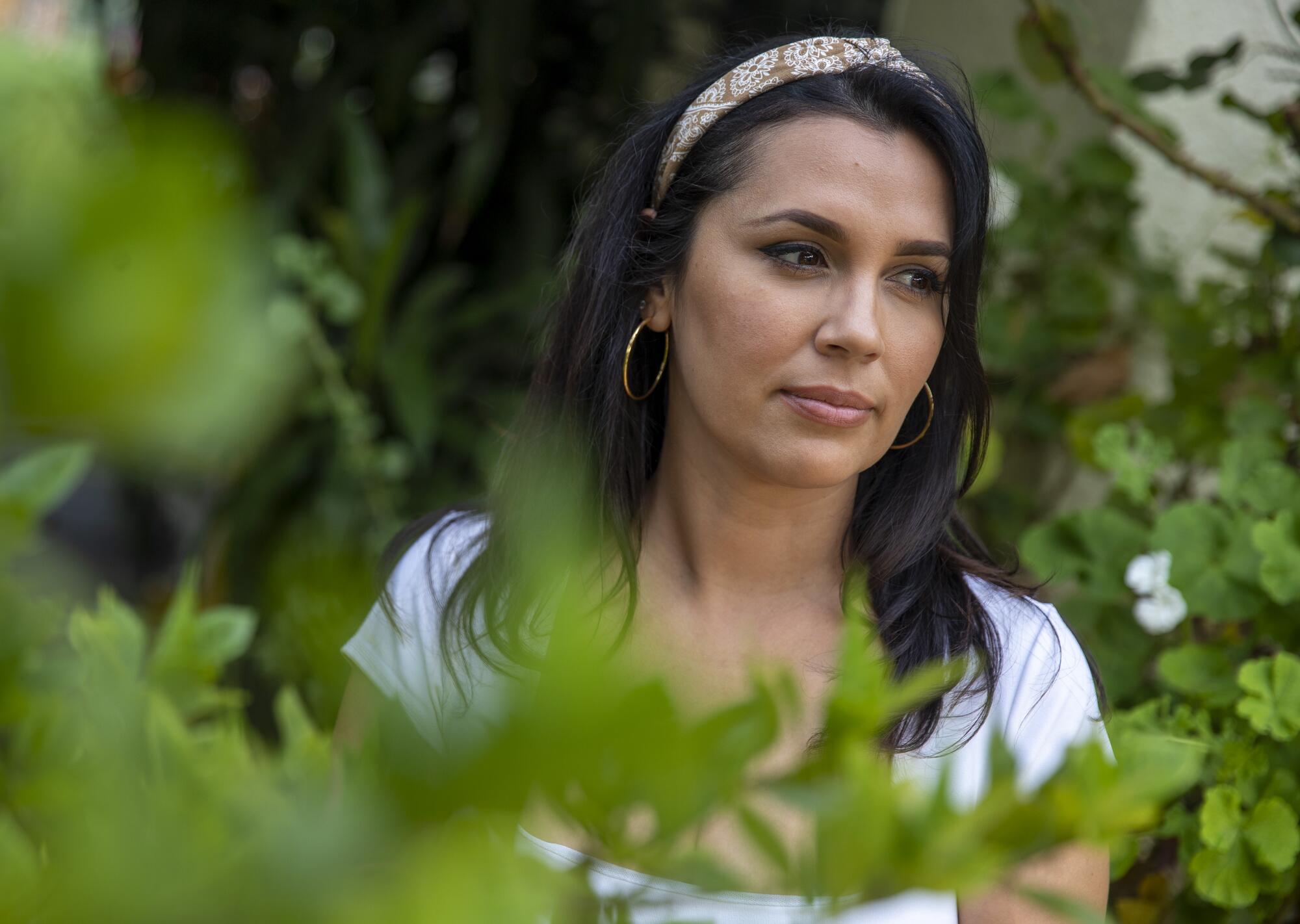
In the fall of 2018, Ryan, a Latina who grew up in South L.A., found a retail space on Main Street in the Fashion District. The city prohibits cannabis retailers within 700 feet of one another, but when Ryan checked the licensing map on the cannabis department’s website, she said she found no conflicting locations. That November she signed a $6,450 monthly lease.
A year later and still with no license, Ryan looked at the map again and noticed another cannabis location 550 feet from hers.
Ryan entreated several city officials, including Garcetti, for help. In her email, Ryan explained that she’d already borrowed money from relatives and cashed out her 401(k), as well as college savings accounts for her sons, then ages 14 and 11 — all part of her family’s goal of becoming entrepreneurs and saving up to open a family restaurant.
Pot shop approvals have hit their limit in Venice and other areas, but the City Council can exceed those caps. Some worry that the application process will favor the politically connected.
In July, Ryan, now 37, received an email from the cannabis department, telling her the agency couldn’t move ahead with reviewing her paperwork because there was another commercial cannabis business nearby. Ryan sued the city in August, alleging it had failed to issue licenses in a transparent manner.
The cannabis regulation department declined to comment on Ryan’s case, including her claim of a discrepancy on the map, and directed inquiries to the city attorney’s office, which also declined to comment citing pending litigation. In court papers filed in November, the city denied several of the allegations Ryan laid out in her lawsuit and said it had complied with all laws and regulations.
The pressures have weighed on Ryan’s family. Facing the financial strain of covering the rent, her husband spent sleepless nights researching cannabis regulations. Her eldest son, now 17, felt compelled to get a job at Starbucks so he could pay his own phone bill.
They’ve invested more than $250,000 so far, and at one point Ryan’s mother sold a plot of land she owned in Tijuana. Her grandmother, Karla Benavides, hand-made thousands of pork and cheese tamales to sell. The family’s plan was to use profits from the cannabis shop to open a restaurant — Casa Tamal, they planned to call it — where Benavides’ recipes would have a permanent home.
The 73-year-old said she supports and understands her granddaughter’s dream.
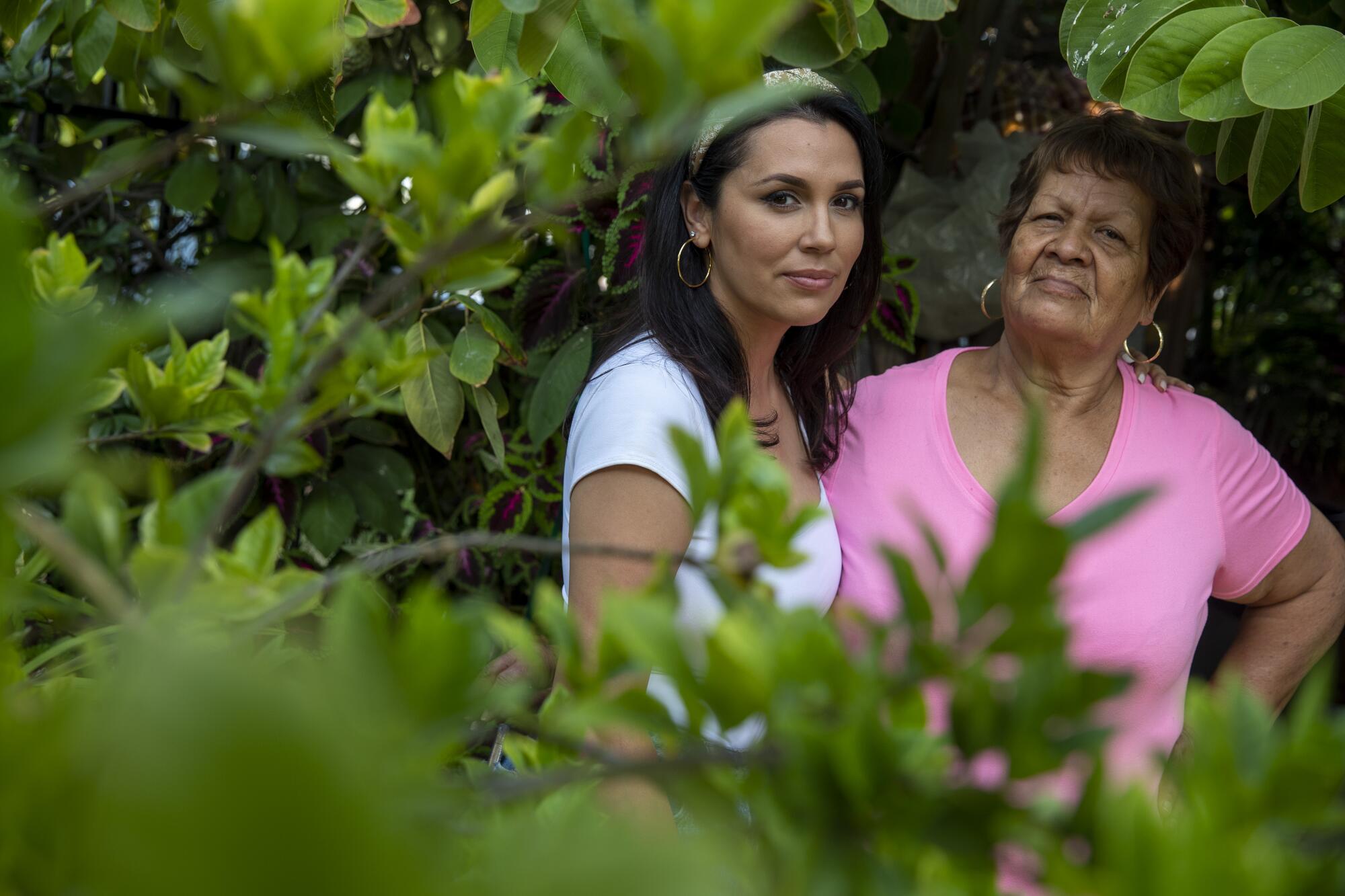
When Benavides was diagnosed with Stage 3 ovarian cancer a few years ago, she avoided many of the ill effects of chemotherapy, a blessing she attributes to the cannabis-infused tinctures her granddaughter purchased for her.
“All of our savings, everything we had, is gone,” Benavides said through tears from her South L.A. home. “They deceived us. And there are other people like us — people who had hope and put everything in and lost everything.”
A devout Catholic, she often asks the Virgen de Guadalupe to give her strength, and repeats a phrase like a mantra: La esperanza muere al último.
Hope dies last.
Times data journalist Aida Ylanan contributed to this report.
More to Read
Sign up for Essential California
The most important California stories and recommendations in your inbox every morning.
You may occasionally receive promotional content from the Los Angeles Times.

